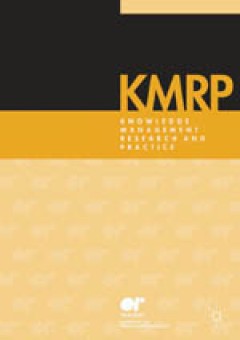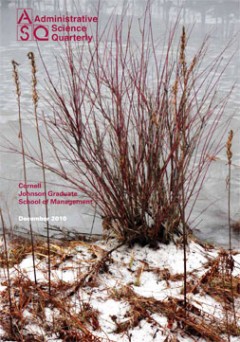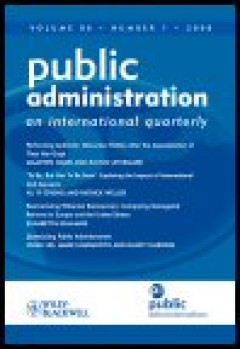Filter by

Software and human agents in Knowledge Codification
In the age of digital networks and databases, gathering data is no longer a differentiating attribute. Instead, the onus is upon creating knowledge and codifying it into the organizational routine. The central theme of this paper is to offer a systematic knowledge codification routine that embodies specific agent attributes and best re-engineering practices. The knowledge process re-engineering…
- Edition
- Vol. 8, No. 1, March 2010.pp. 45–60
- ISBN/ISSN
- 14778238
- Collation
- -
- Series Title
- Knowledge Management Research & Practice
- Call Number
- -

The Inventor game : game-theoretical analysis of knowledge-sharing between in…
Knowledge-sharing has often been analysed by one-shot game models, where the balance between costs and the value of knowledge exchanges for different exchange partners has been calculated. This paper reviews this literature and discusses five of its assumptions: (1) the assumption of homogeneity of knowledge, (2) the assumption of one-shot solutions, (3) the assumption of knowledge as value, (4…
- Edition
- Vol. 8, No. 1, March 2010.pp. 61–75
- ISBN/ISSN
- 14778238
- Collation
- -
- Series Title
- Knowledge Management Research & Practice
- Call Number
- -

Understanding of knowledge management roles and responsibilities : a study in…
Most of the studies in knowledge management (KM) argue for leadership as a vital success factor for any initiative. Top management leadership enables the effective promotion of knowledge sharing by creating an appropriate organisational culture, and making arrangements for corresponding policies and procedures across the organisation to facilitate management of knowledge resources and practices…
- Edition
- Vol. 8 No. 1, March 2010.pp. 76–88
- ISBN/ISSN
- 14778238
- Collation
- -
- Series Title
- Knowledge Management Research & Practice
- Call Number
- -

Global faculty learning community : a case study
This case study provides an exploratory analysis of the Faculty Learning Community (FLC) aimed at encouraging and supporting sharing of teaching experiences among faculty members at Universitas 21 Global (U21G). The analysis reveals a community in the formative stages of evolutionary development. The preliminary results indicate a prevailing pattern of knowledge sharing characterised by low int…
- Edition
- Vol. 8, No. 1, March 2010.pp. 89–98
- ISBN/ISSN
- 14778238
- Collation
- -
- Series Title
- Knowledge Management Research & Practice
- Call Number
- -

The Paradox of Meritocracy in Organizations
In this article, we develop and empirically test the theoretical argument that when an organizational culture promotes meritocracy (compared with when it does not), managers in that organization may ironically show greater bias in favor of men over equally performing women in translating employee performance evaluations into rewards and other key career outcomes; we call this the �paradox of me…
- Edition
- Vol. 55, No. 4 December 2010. pp. 543-576
- ISBN/ISSN
- 00018392
- Collation
- -
- Series Title
- Administration Science Quarterly
- Call Number
- -

Organizing the In-between : The Population Dynamics of Network-weaving Organi…
This article examines the population dynamics and viability of network weavers, which are organizations that provide network relations for others. An analysis of the population dynamics of the intergovernmental organizations (IGOs) that are the basis of the interstate networks that influenced global economic relations, peace, and democracy in the 1815�2000 period shows that IGO founding and fai…
- Edition
- Vol. 55, No. 4 December 2010. pp. 577-605
- ISBN/ISSN
- 00018392
- Collation
- -
- Series Title
- Administration Science Quarterly
- Call Number
- -

Markets, Morals, and Practices of Trade : Jurisdictional Disputes in the U.S.…
This study examines the U.S. commerce in human cadavers for medical education and research to explore variation in legitimacy in trades involving similar goods. It draws on archival, interview, and observational data mainly from New York State to analyze market participants� efforts to legitimize commerce and resolve a jurisdictional dispute. Building on literature on professions, the study sho…
- Edition
- Vol. 55, No. 4 December 2010. pp. 606-638
- ISBN/ISSN
- 00018392
- Collation
- -
- Series Title
- Administration Science Quarterly
- Call Number
- -

Network Churn : The Effects of Self-Monitoring Personality on Brokerage Dynamics
The apparent stability of social network structures may mask considerable change and adjustment in the ties that make up the networks. In this study, we theorize and test�using longitudinal data on friendship relations from a radiology department located in the Netherlands�the idea that the characteristics of this �network churn� and the resultant brokerage dynamics are traceable to individual …
- Edition
- Vol. 55, No. 4 December 2010. pp. 639-670
- ISBN/ISSN
- 00018392
- Collation
- -
- Series Title
- Administration Science Quarterly
- Call Number
- -

THE IRREPRESSIBLE ROD RHODES : CONTESTING TRADITIONS AND BLURRING GENRES
Rod Rhodes spent 25 years as the Editor of Public Administration before he retired from that role at the end of 2010. These essays in his honour are intended to celebrate the achievement of those 25 years and reflect on his contribution to the worlds of public administration and political science. Rod has now consolidated the standing of the journal as one of the most significant locations for …
- Edition
- Volume 89, Issue 1, March 2011. pages 1–14
- ISBN/ISSN
- 00333298
- Collation
- -
- Series Title
- Public Administration
- Call Number
- -

WAS LOCAL GOVERNANCE SUCH A GOOD IDEA? A GLOBAL COMPARATIVE PERSPECTIVE
The idea of local governance has gained much prominence but can elected local government be sustained in a role as network coordinator alone? To investigate this question this article focuses attention on four societal roles that local government systems undertake. They can support political identity, underwrite economic development, facilitate social welfare provision or act as a lifestyle co-…
- Edition
- Volume 89, Issue 1, March 2011. pages 15–31
- ISBN/ISSN
- 00333298
- Collation
- -
- Series Title
- Public Administration
- Call Number
- -

THE NEW ORTHODOXY : THE DIFFERENTIATED POLITY MODEL
Anthony King (1989, p. 97) argued some time ago that: �most of Britain's best political scientists (�) are for some reason journalists'. This is a claim which could only be made by someone who thinks that understanding, or explaining, politics merely revolves around knowing what happens at the centre of power. It neglects the point that facts do not speak for themselves; rather, they have to be…
- Edition
- Volume 89, Issue 1, March 2011. pages 32–48
- ISBN/ISSN
- 00333298
- Collation
- -
- Series Title
- Public Administration
- Call Number
- -

NETWORKS : REIFIED METAPHOR OR GOVERNANCE PANACEA?
This article will discuss the contribution of Rod Rhodes to the research on networks. I will focus on networks as a typology of state/society relations and as a particular form of governance. It is not only here that Rhodes has left his deepest mark; most research on networks still falls in one of the two sub-fields. The typology of policy networks, which he developed with David Marsh more than…
- Edition
- Volume 89, Issue 1, March 2011. pages 49–63
- ISBN/ISSN
- 00333298
- Collation
- -
- Series Title
- Public Administration
- Call Number
- -

CORE EXECUTIVE STUDIES TWO DECADES ON
The concept of the �core executive� was introduced by Dunleavy and Rhodes in 1990. Two decades on, what is the state of core executive studies? This article argues that the language of the study of central government has been transformed. In addition, there is now a much broader consideration of the central government space, incorporating ministers, civil servants, and so on. Within core execut…
- Edition
- Volume 89, Issue 1, March 2011. pages 64–77
- ISBN/ISSN
- 00333298
- Collation
- -
- Series Title
- Public Administration
- Call Number
- -

THE WHITEHALL PROGRAMME AND AFTER : RESEARCHING GOVERNMENT IN TIME OF GOVERNANCE
This article revisits the Whitehall Programme and Rod Rhodes' crucial role in setting it up. It examines the research commissioned for the Programme and how research in this field has changed since the mid 1990s. It confirms that research on Whitehall has become more diverse and specialist � reflecting its apparent hollowing-out � but that research employing a longer historical perspective does…
- Edition
- Volume 89, Issue 1, March 2011. pages 78–92
- ISBN/ISSN
- 00333298
- Collation
- -
- Series Title
- Public Administration
- Call Number
- -

GOVERNMENT : A SUITABLE CASE FOR TREATMENT?
Government � its institutions, its working, its constitutional controls � is hugely important, not just as a subject of gossip or history in the making but as a discipline. Rod Rhodes' achievement in pioneering new ways of mapping and analysing developments inside government from the inside, and in coordinating so many different academic studies, was a remarkable model of the sort of research i…
- Edition
- Volume 89, Issue 1, March 2011. pages 93–100
- ISBN/ISSN
- 00333298
- Collation
- -
- Series Title
- Public Administration
- Call Number
- -

RHODES' CONTRIBUTION TO GOVERNANCE THEORY : PRAISE, CRITICISM AND THE FUTURE …
This article discusses Rod Rhodes' contribution to governance theory. Rod Rhodes' work on governance has been much quoted. He has contributed to setting a new governance agenda and to an ongoing governance debate. This debate has also had an impact on political practice. However, as this paper argues, Rhodes' definition of governance is problematic in that it is narrowly identified with network…
- Edition
- Volume 89, Issue 1, March 2011. pages 101–113
- ISBN/ISSN
- 00333298
- Collation
- -
- Series Title
- Public Administration
- Call Number
- -

NOT ODIOUS BUT ONEROUS : COMPARATIVE PUBLIC ADMINISTRATION
This paper asks, first, how have comparative publications (academic �outputs�) developed during the past three decades; second, what theories have been in play, and, third, how can we best explain the picture of comparative PA that is thus revealed? The trajectories of themes and theories are set within a wider story of the development of networks and academic communities. Changes in practition…
- Edition
- Volume 89, Issue 1, March 2011. pages 114–127
- ISBN/ISSN
- 00333298
- Collation
- -
- Series Title
- Public Administration
- Call Number
- -

IT'S PUBLIC ADMINISTRATION, ROD, BUT MAYBE NOT AS WE KNOW IT : BRITISH PUBLIC…
This paper assesses what happened to academic public administration (PA) in Britain in the 2000s in the light of Rod Rhodes' gloomy prognostications about the future of the subject in the late 1990s. It argues that British PA had such a good decade in the 2000s, in funding, output, academic-practitioner interaction and institutional developments, that it could almost be said to have �never had …
- Edition
- Volume 89, Issue 1, March 2011. pages 128–139
- ISBN/ISSN
- 00333298
- Collation
- -
- Series Title
- Public Administration
- Call Number
- -

THE STUDY OF PUBLIC ADMINISTRATION IN THE UNITED STATES
The study of public administration in the United States is large in terms of the number of academic programmes, the range of journal publications, and the number of scholars. Its scholarship attracts attention from all over the globe. At the same time it is a public administration that is clearly embedded in a specific national culture, just as anywhere else. Three of the main challenges includ…
- Edition
- Volume 89, Issue 1, March 2011. pages 140–155
- ISBN/ISSN
- 00333298
- Collation
- -
- Series Title
- Public Administration
- Call Number
- -

ELITE ETHNOGRAPHIES : POTENTIAL, PITFALLS AND PROSPECTS FOR GETTING ‘UP CLO…
This article celebrates Rod Rhodes' use of ethnography to study political elites �up close and personal�. Initially Rhodes' work is contextualized within the development of political ethnography more generally, before his ethnographies of �Everyday life in a Ministry� are reviewed, illustrating the potential of ethnography to research policy-making elites. This review highlights epistemological…
- Edition
- Volume 89, Issue 1, March 2011. pages 156–166
- ISBN/ISSN
- 00333298
- Collation
- -
- Series Title
- Public Administration
- Call Number
- -
 Computer Science, Information & General Works
Computer Science, Information & General Works  Philosophy & Psychology
Philosophy & Psychology  Religion
Religion  Social Sciences
Social Sciences  Language
Language  Pure Science
Pure Science  Applied Sciences
Applied Sciences  Art & Recreation
Art & Recreation  Literature
Literature  History & Geography
History & Geography